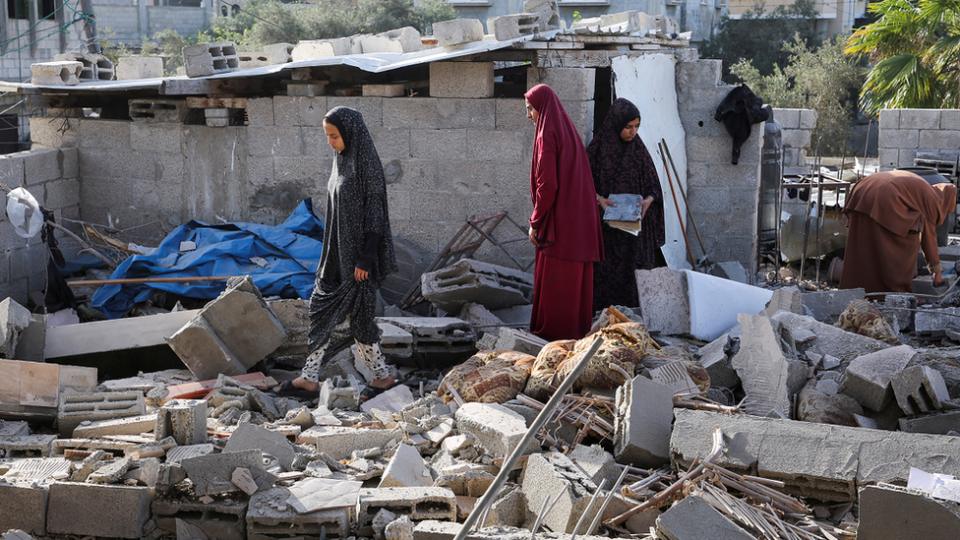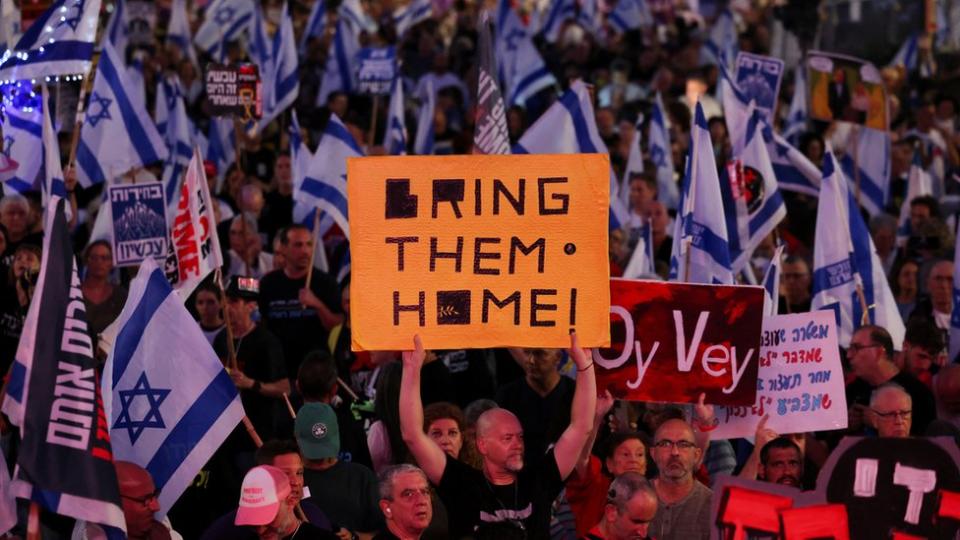Tens of thousands rally for hostage deal as Gaza ceasefire talks continue
Tens of thousands of Israelis gathered late at night to demand an agreement on the repatriation of hostages, before new ceasefire negotiations.
Protesters in Tel Aviv chanted “war is not holy, life is”, some blaming the prime minister Benjamin Netanyahu of wanting to prolong the conflict in Gaza.
This came as a Hamas delegation met with mediators in Egypt on Saturday.
The group said there were no new developments, but added that “a new cycle will begin” on Sunday.
Negotiators in Cairo resumed long-running ceasefire negotiations – brokered by Egypt and Qatar – on the suspension of the Israeli offensive in Gaza in exchange for the release of the hostages.
The main sticking point appears to be whether the deal would be temporary or permanent.
The language under discussion is believed to imply a 40-day pause in fighting while the hostages are released and a number of Palestinian prisoners held in Israeli jails are released.
An adviser to Hamas leader Ismail Haniyeh said the group was studying the latest proposal with “the utmost seriousness.”
But he reiterated his demand that any deal should explicitly include an Israeli withdrawal from Gaza and a complete end to the war.
In an interview with the BBC, Israeli Minister Amichai Chikli said the war would continue “until Hamas is eliminated.” “We do not have the possibility of accepting an agreement that includes the end of the war or the abandonment of a large-scale operation in Rafah,” he added.
Separately, an unnamed Israeli government official told local media on Saturday that Israel “would under no circumstances agree to end the war as part of a deal to release our abductees.”
They added: “The Israeli army will enter Rafah and destroy the remaining Hamas battalions there – whether or not there is a temporary pause to free our captives.”
Mr Netanyahu has faced pressure from within his far-right coalition to press ahead with a long-promised offensive in Gaza’s southernmost city, where around 1.4 million people have sought refuge after fleeing the fighting in the north and center of the strip.
The United States – Israel’s largest diplomatic and military ally – is reluctant to support a new offensive that could cause significant civilian casualties, and has insisted there must first be a plan to protect the Displaced Palestinians.


Saturday’s protests in Israel are the latest manifestation of growing domestic pressure Mr. Netanyahu faces to secure the return of the hostages.
Of the 252 people kidnapped by Hamas on October 7, 128 are still missing – and of those, at least 34 are presumed dead.
Natalie Eldor, a protester in Tel Aviv, told the Reuters news agency she was there to “support a deal now, yesterday.”
“We must bring back all the hostages, those who are alive and those who are dead. We must bring them back. We must change the government,” she added.
Some present at the Kirya military base in Tel Aviv accused the prime minister of undermining the proposed truce, while others called for an end to the war.
Addressing the prospects of a truce on Saturday, Minister Benny Gantz, a member of Israel’s war cabinet, said: “An official response with broad outlines has not yet been received. Once accepted, the war management cabinet will meet and discuss it.
“Until then, I suggest to ‘political sources’ and all decision-makers to wait for official updates, act calmly and not descend into hysteria for political reasons.”
Ceasefire talks have continued for months without any progress, and there has been no break in fighting or release of hostages since late November.
There have been times when a new deal seemed imminent – only to fall through before being signed.
A source close to this latest round of talks told the BBC that the negotiations were still complex and a breakthrough could still take several days.


Meanwhile, the head of the UN World Food Program has warned that northern Gaza is now experiencing “widespread famine”.
Cindy McCain warned that the catastrophic situation in the territory was spreading south in an interview with US media.
“What we are asking for and what we have continually asked for is a cease-fire and the ability to have unfettered access to enter safely,” Ms. McCain said.
The war began after waves of Hamas gunmen stormed across the Gaza-Israel border on October 7, killing around 1,200 people and taking more than 250 hostages. The group is considered a terrorist organization by many Western countries.
During the ensuing Israeli military campaign in Gaza, more than 34,600 Palestinians were killed and more than 77,900 injured, according to figures from the Hamas-run territory’s Health Ministry.
Additional reporting by Anna Foster and Andre Rhoden-Paul
yahoo


